_We may earn revenue from the products available on this page and participate in affiliate programs. Learn more ›
_
Best Parachute Hammock
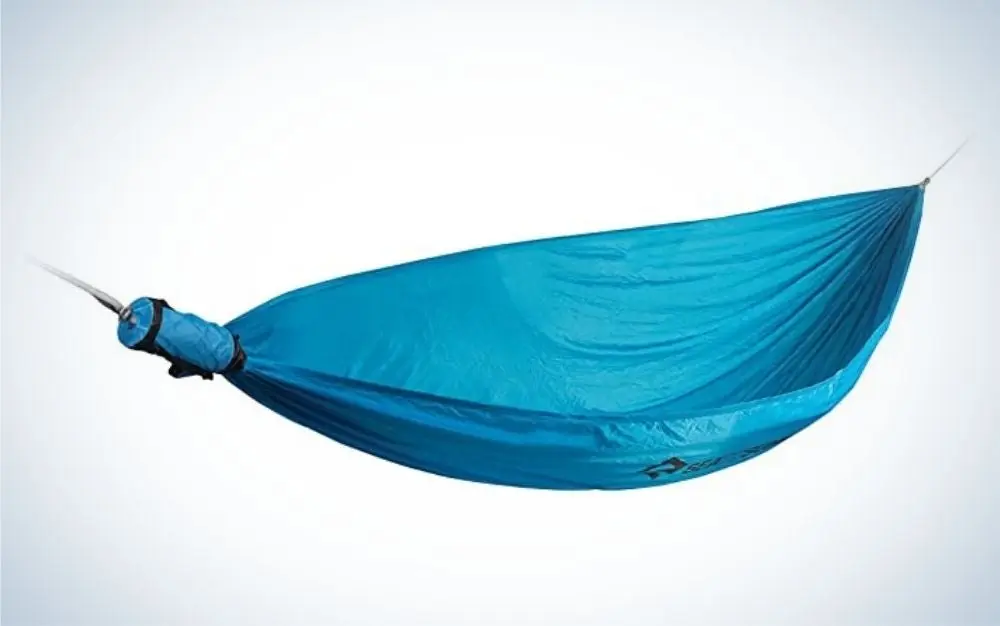
Sea to Summit Pro Hammock Set
LEARN MORE
Summary
Utilizing a 15 mm webbing system makes this hammock easier to set up than the typical 2-part suspension system.
Best Backpacking Hammock
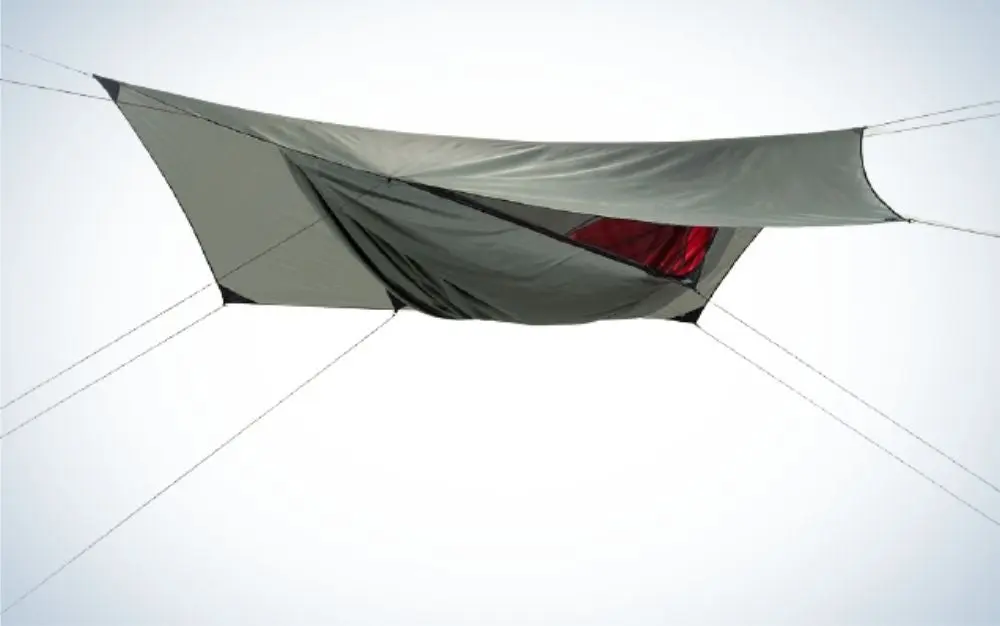
Hennessy 4Season Expedition Zip
LEARN MORE
Summary
The 4Season design allows users to adjust the hammock depending on the climate and temperature conditions. If you use only the oversized open cell foam pad, the hammock is rated down to 40 F / 4 C.
Best Ultralight Hammock
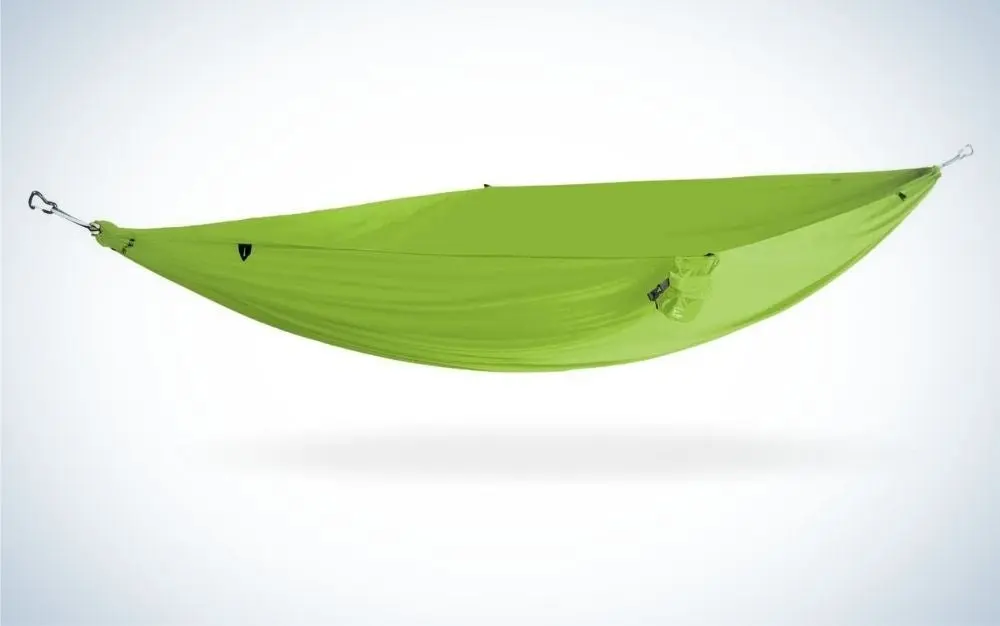
Kammok Roo Single Ultralight
LEARN MORE
Summary
The Kammok Roo Single Ultralight hammock on its own weighs only 5.6 ounces. Combined with the Kammok featherlight Python 10 Ultralight straps, it is still only 8 ounces.
Camping hammocks can be lightweight, comfortable, and easy way to get up off the ground, no matter how you choose to camp. From backpacking to car camping, you’ll find a hammock that fits your needs in my top picks.
Go beyond the casual backyard hang and elevate your camping experience by lounging between the trees. Hammocking gives you prime real estate in the wild, but you’ll want to know the ropes before you set out. Get to know what makes a good hammock and some of the best camping hammocks on the market before investing in one yourself.
Best Parachute: Sea to Summit Pro Hammock Set
Best Backpacking Hennessy 4Season Expedition Zip
Best Ultralight: Kammok Roo Single Ultralight
Most Comfortable: Warbonnet Ridgerunner
Best Portable: Dutchware Chameleon
How We Chose The Best Camping Hammocks
When looking for the best camping hammocks on the market, I narrowed down my top picks by evaluating a few key aspects of hammock design:
Construction: Hammocks are subjected to a variety of forces. They must withstand the occupant’s weight as well as the pull created by the trees holding it up. It must be built with durable materials if it’s going to last through many outings. Of course, it must be comfortable to provide a good night’s rest. These hammocks will make sure that falling feeling is just a dream.
Suspension system and ease of setup: How long it takes to get your hammock hung and the difficulty of hanging it play a role in selection. Spending an undue amount of time setting up camp is not only annoying but will also take away from time to enjoy the outdoors. My selections go up easy so you can concentrate on enjoying your trip.
Additional features: I also considered additional features as a bonus to the baseline requirements of construction, durability, ease of use. Things like bug netting, storage compartments, and rain flies are a huge plus if a hammock already hits the three crucial features. Factoring in these considerations helped land me on my selections.
The Best Camping Hammocks: Reviews & Recommendations
Best Parachute: Sea to Summit Pro Hammock Set

Why It Made The Cut: Parachute nylon hammocks are generally affordable and are among the most durable hammock fabrics on the market. The Sea to Summit Pro Hammock Set has the right feel, durability, and price while providing a reliable hammock camping experience.
Key Features
Hammock Package Weight: 19.7 ounce (single) / 23.6 ounce (double)
Weight Capacity: 400 pounds
Materials: ripstop 70D nylon
Pros
Easy set up
Versatile
Lightweight
Affordable
Cons
Only compatible with branded suspension system
Bug net and tarp sold separately
The Sea to Summit Pro is a versatile hammocking system that allows for a low budget without compromising on quality. This hammock is perfect for people just getting into hammock camping or those looking for a backyard hammock to use camping on occasion.
Once you’ve set it up once or twice, you’ll be able to set up camp in minutes. The super breathable, lightweight, yet durable fabric makes it an excellent option for backpacking, car camping, or just a backyard hang. The suspension system can only be bought from Sea to Summit, but it uses buckles that are triple bar-tacked to the webbing loops and comes with a compression sack that fits the entire hammock and straps. Utilizing a 15 mm webbing system makes this hammock easier to set up than the typical 2-part suspension system.
Other system pieces like the bug net or tarp are sold separately, but they make for added value if you plan to use this hammock primarily for camping.
Best Backpacking: Hennessy 4Season Expedition Zip
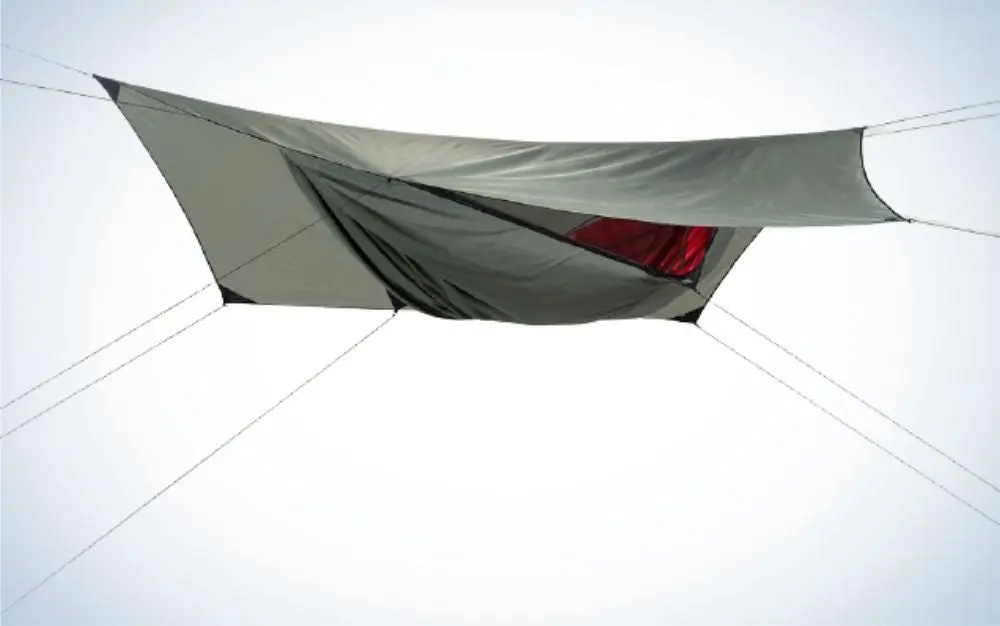
Why It Made The Cut: The Hennessy 4Season Expedition Zip Hammock found a way for hammock campers in varying climates to have a lightweight hammock that does not compromise weather protection or warmth when in the backcountry.
Key Features
Hammock Package Weight: 5 pounds 3 ounces
Weight Capacity: 250 pounds
Materials: 1 layer of 70d nylon and 1 layer of 40d nylon
Pros
Cold weather compatible without adding unnecessary weight
Comfortable for diagonal sleeping
Unique ridgeline ensures shape no matter the tree spacing
Add or shed portions of the hammock to match the seasons
Cons
Can be difficult to set up properly
Hard to repack into the compression sack provided
Hennessy has a wide range of high-quality and highly rated backpacking and camping hammocks available, but the 4Season is my top pick for a backpacking hammock. Weather protection and hammock camping in varying seasons when backpacking can come with a learning curve. It becomes much easier to get a good night’s sleep with the best camping hammock, no matter the temperature.
The 4Season design allows users to adjust the hammock depending on the climate and temperature conditions. If you use only the oversized open cell foam pad, the hammock is rated down to 40 F / 4 C. But adding an insulating blanket under the pad allows most people to sleep in below-freezing temperatures.
The open-cell foam pad is removable and more insulation (i.e., jackets, towels, clothing, etc.) can be spread out on top of the pad to add even more insulation while you sleep. If you are camping in warmer weather, you can leave the pad out and allow air to flow between the two layers of fabric.
It also comes with a bug net and a tarp for complete protection from the elements. You can add or shed certain parts of the hammock pending the temperature and season which means that you’ll only need one hammock to backpack year-round.
Best Ultralight: Kammok Roo Single Ultralight

Why It Made The Cut: Most hammocks on my list are going to be suitable for backpacking. They tend to be smaller and lighter weight than tents, but the Kammok Roo Single Ultralight takes the cake. It is lightweight, easy to set up, and even with the lighter fabric, holds up well with heavy use.
Key Features
Hammock Package Weight: 8 ounce
Weight Capacity: 300 pounds
Materials: 20D ripstop nylon
Pros
Simple set up
Lightweight
Packs down small
Cons
Suspension straps sold separately
Pylon 10 UL straps wear down quickly in high use-areas
The Kammok Roo Single Ultralight hammock on its own weighs only 5.6 ounces. Combined with the Kammok featherlight Python 10 Ultralight straps, it is still only 8 ounces. Kammok was able to pull off such an ultralight hammock because it uses 20-denier nylon ripstop fabric.
The first time you pick this hammock up, you’ll notice how thin this fabric feels. Don’t be fooled on the feel alone! Yes, it will be less durable than other hammock fabrics on the list, but it is still strong enough to provide a safe, comfortable hammock camping experience. Most ultralight materials tend to be thinner, and with that, the user should take extra care when using it in the backcountry to get the most out of their hammock.
Another way they cut off some weight is with their innovative toggle-and-loop connection points. These are much smaller and lighter than the standard carabiners that are used on most hammocks. All in all, this hammock is probably small enough to fit in your backpack’s hip belt pocket. So, if you are looking for the best ultralight backpacking hammock, look no further.
Most Comfortable: Warbonnet Ridgerunner
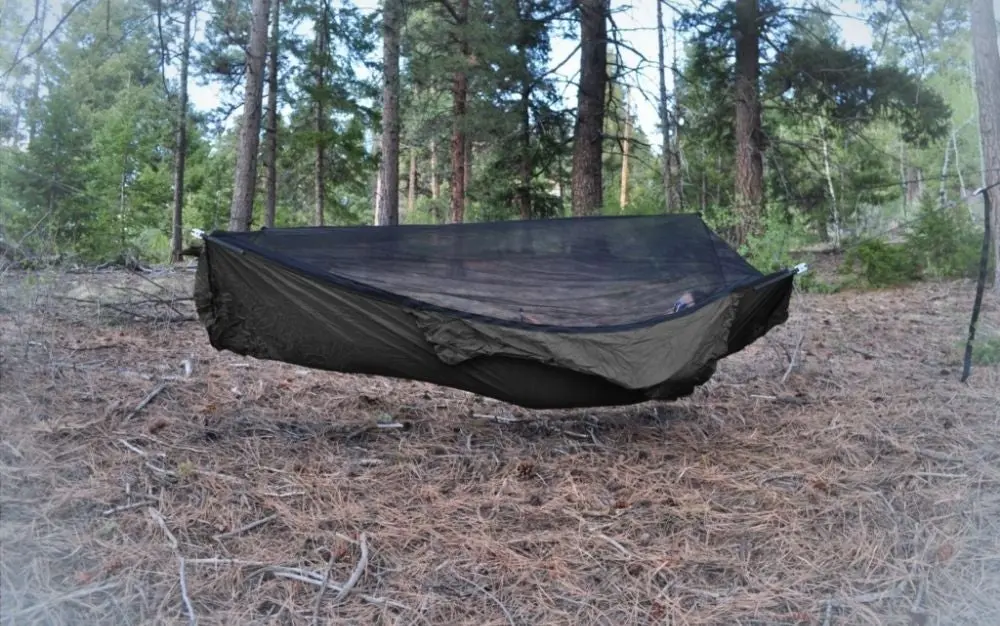
Why It Made The Cut: The Warbonnet Ridgerunner hammock provides a close to flat lying position thanks to the innovative spreader bars. It comes with an integrated bug net and plenty of interior storage, making it a perfect companion to any camping adventure.
Key Features
Hammock Weight: 1 pound 1.75 ounces (30D) / 1 pound 3.8 ounces (40D) without suspension
Weight Capacity: 200 pounds (single) / 250 pounds (double)
Materials: 40D Dream-Tex Fabric
Pros
Flatter sleeping surface than most hammocks
Gear pockets
Several design options
Cons
Kind of heavy for backpacking
Susceptible to tipping over
Unlike some other tree tent designs that provide a flat experience similar to hammocking, the Warbonnet Ridgerunner found the perfect innovation to let you lay flat while being suspended between the trees. It is made from top-of-the-line Dream-Tex fabric with your choice between a single or double-layer bottom. It comes in both 30 and 40 denier fabrics.
You can comfortably lay on your side, back, or even your stomach in this hammock, making it one of the most comfortable picks on my list. It works with standard sleeping pads and is designed with a built-in head and neck contour for additional comfort.
Overall, this might not be the lightest camping hammock you’ll find. If you are a side sleeper or stomach sleeper and are looking for a more comfortable hammocking experience, the extra weight from the spreader bars is well worth a good night’s sleep.
Best Portable: Dutchware Chameleon
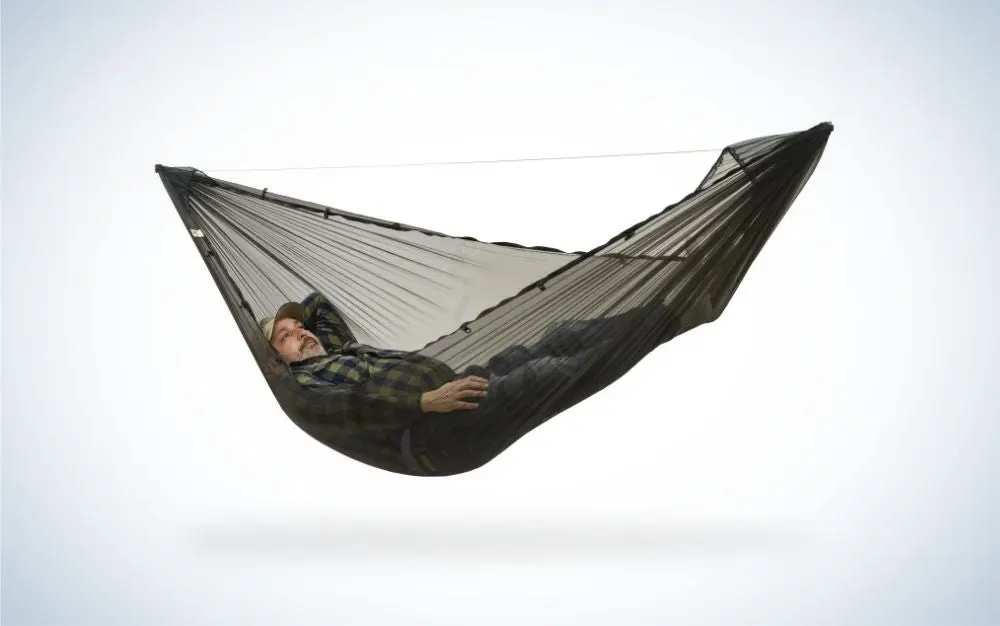
Why It Made The Cut: The Dutchware Chameleon is the best portable camping hammock because it lives up to its name. It allows users to add and change out parts of the hammock to make it the only hammock you’ll ever need. It is the most adaptable hammock for camping you’ll find.
Key Features
Hammock Package Weight: 37 ounces
Weight Capacity: 200-350 pounds (material dependent)
Materials: Hexon 1.0, Hexon 1.2, and Hexon 1.6
Pros
Customizable
Comfortable
Lightweight
Packable
Cons
Non-removable ridgeline
High price point pending the package you choose
Die-hard hammockers and newbie hammock campers will enjoy the Dutchware Chameleon hammock equally. You can customize this hammock to fit your specific camping needs. The immense level of versatility and adaptability is what pushed the Dutchware Chameleon to the top of my list when compared to other portable hammock options.
This 11-foot hammock comes with the option of three different types of Hexon fabric, with the Hexon 1.6 being the strongest. The Hexon 1.6 fabric is now made with Nylon 66 and is made exclusively for Dutchware. It is rated for 350 pounds and utilizes a specialized ripstop grid to reduce stretch and add strength.
The Dutchware Chameleon reflects adaptability in the name and its design. It is lightweight, highly functional, and can handle any environment you set it up in as long as you invest in the appropriate hammocking pieces.
Look at a hammock with a bug net and suspension as an example. This hammock not only can adjust to varying elevations and terrain, but you will have a hammock that will protect you from summer swarms of insects. That particular hammock is great for warm weather, but for colder weather, you’ll want to add a detachable vented cover. In the end, you can customize your Chameleon for any season and any use.
Things to Consider Before Buying The Best Camping Hammocks
Hammocks are a relatively versatile piece of outdoor gear. You can use them for backyard hangs, beach days, and even extended backpacking trips. So, how exactly should you narrow down all of your options?
When choosing the best camping hammock for you, consider the following keys to finding the perfect camping hammock
:
Intended Use
Are you planning to use your hammock for ultralight backpacking or car camping?
The intended use will determine a lot about the hammock you choose because of the weight, pack size, and materials used. After all, if you are looking for an ultralight hammock, you may have to sacrifice some durability to cut weight.
A tent or even a cot is a better fit for some people for their camping needs. The good news is that a hammock isn’t a large piece of gear, so if you are a backpacker, a hammock may be ideal for your camping needs. If you prefer to set up a basecamp for longer expeditions, then looking into some of the best camping cots
may be better.
Size
The size of hammocks for camping can be broken down into two categories: single or double.
Single Hammock: most backpackers opt for single-wide hammocks to cut weight. The smaller size might be lighter, but it does mean you’ll have less space to move around while you sleep. These hammock sizes will generally range from 4-5′ in width and have a weight capacity from 300-400 lbs (ultralight hammocks tend to be closer to 250 lbs).
Double Hammock: you can share a double hammock with another person, providing a roomy sleep experience for one person. Double hammocks provide higher levels of comfort for many campers. They are roomier, after all. Not all hammocks are the same length either, so your body size should be reflected in the hammock size you choose. If you are someone that tosses and turns a lot while you sleep, good camping hammocks in this size range will make you feel less claustrophobic. Many double hammocks range in width from 5-6′ and have weight capacities anywhere from 400-500 lbs (ultralight closer to 350 lbs).
The hammock’s length should also be considered in comparison to your height. Most hammocks will have similar lengths, and the length is only really a concern if you are tall. They do make hammocks for taller individuals, so you may need to branch out of more traditional models during the search. Some hammock brands may also have a few sizing options on their websites.
To find a hammock of the appropriate length, you’ll be most comfortable with a length of at least 2 feet longer than you are tall.
Materials
Camping hammocks tend to be made from more heavy-duty fabrics than lounge hammocks. Many lightweight camping hammocks are made from synthetic materials, but hammocks, in general, can be made from cotton, cotton blends, or even parachute silk. Lounging hammocks, especially on beaches, might be made from rope woven together to make a net hammock.
While avid hammockers may argue that cotton is more comfortable than synthetic for a hammock, materials like polyester and nylon tend to be lighter and more durable, making them good camping hammocks. Synthetics also tend to withstand moisture much better and will be less likely to mold or mildew with extended use outside.
When looking at materials for hammocks for camping, you may notice a number paired with the word “denier” next to it. Denier is a durability rating that specifies the weight of the fabric. Denier tells you the density based on the weight and length of the material’s fibers. A lightweight camping hammock likely has a lower denier than ones with thicker fabric. A more durable hammock will use close to 70-denier fabrics, whereas an ultralight will be closer to 30-denier.
Accessories
Not all hammocks will have the same accessories. Some hammocks may only be sold as hammocks, and that’s it. To turn standard hammocks into camping hammocks, you need to buy and add accessories like bug nets and tarps. You can use standard camping tarps
for making a rain cover for a hammock, but many hammocks have specialty-designed tarps that fit them best. Even if the tarp isn’t included with the initial package, it can often be bought separately from the same company.
You’ll also need suspension straps and a way to hang the hammock. While this comes with most hammock systems, you may need to buy even the most essential accessories separately when buying individual hammocks. The accessories you choose will often come down to intended use, so decide that first and then start diving into necessary accessories.
FAQs
Q: Is sleeping in a hammock better than a tent?
This is a subjective question, because think about it, you can’t necessarily string up a hammock between a couple of saguaros. So, depending on your environment, camping in a tent could be better than hammock camping. However, hammock camping is an excellent option for areas that are heavily wooded or exceptionally hilly. No one likes sliding to the bottom of their tent or rolling on top of their camping partner because of uneven ground. That said, there are pros and cons to both tent and hammock camping. Tents tend to be more beginner-friendly and easier to set up, they can provide a roomier camp set up, and they are versatile for various weather conditions. Still, even the best camping tents
have limited application when camping in areas with vegetation and sensitive ecosystems, the terrain is rocky, or there are many exposed roots. For the most part, you need to stay in established camping zones to pitch a tent following LNT tent guidelines
and to stay comfortable. Hammocks provide a bit more versatility in terms of where you can set them up, but they can have more of a learning curve to get them set up correctly. Perhaps the biggest limitation hammocks have when camping is that you need a place to hang them. If you are car camping, there are attachments you can get for your car to hang your hammock if you lack trees, but other than that, you’ll need trees strong enough and close enough together to have a good night’s hammock camping. Much like with tents, be sure to follow LNT hammock camping guidelines
.
Q: Is a tent warmer than a hammock?
Hammocks can be extremely comfortable to sleep in while camping, but they do tend to be colder than a tent because you are off the ground and not able to insulate as well. Even with a sleeping pad and hammock blanket, you’ll have more convective heat loss. Heat loss in a hammock can be curved by using a sleeping pad and an under quilt. However, the overall temperature experience will be warmer in a tent even with additional insulation. A tent has better protection from the wind, it is easier to insulate, and it holds your body heat easier.
Q: Who makes the best camping hammock?
The best camping hammock is the one that best fits your camping needs. If you’re looking for the most comfortable car camping hammock, it will be a much different pick than someone looking for the best ultralight backpacking hammock. Use the methodology and reference the “things to consider section” above when trying to determine what the best camping hammock will be for you. As you narrow down your personal preferences and needs, look back at the camping hammock categories and gear choices above and you may find the best hammock for you.
Q: Do you need a bug net for hammock camping?
If you need a bug net for hammock camping often depends on the area you are camping and the number of bugs present. Most people who camp in hammocks report a better night’s sleep when they have a bug net to protect them during the night. So, no, bug nets are not necessary for hammock camping, but the added layer of protection is nice.
Q: How do you pick a hammock for camping?
How you pick a hammock for camping largely boils down to the type of camping you enjoy. First, identify the intended use, frequency of use, and budget. Then you can branch out into evaluating hammock quality, durability, and functionality for your needs. For more information about how to choose a hammock for camping, go back and read the “things to consider before buying a camping hammock” section at the beginning of this article.
Final Thoughts on the Best Camping Hammocks
The best camping hammock for your outdoor ventures will vary slightly from person to person. Because of that, the best overall camping hammock we found is the Dutchware Chameleon. Yes, it is the most portable hammock on the list, but it is also the most customizable, which allows it to be one of the best camping hammocks for anyone.
Why Trust Us
For more than 125 years, Field & Stream has been providing readers with honest and authentic coverage of outdoor gear. Our writers and editors eat, sleep, and breathe the outdoors, and that passion comes through in our product reviews. You can count on F&S to keep you up to date on the best new gear. And when we write about a product—whether it’s a bass lure or a backpack—we cover the good and the bad, so you know exactly what to expect before you decide to make a purchase.






